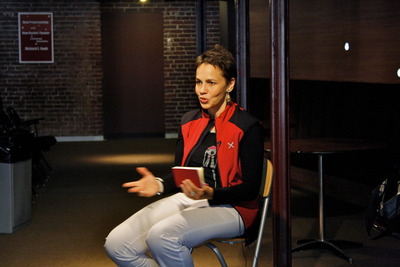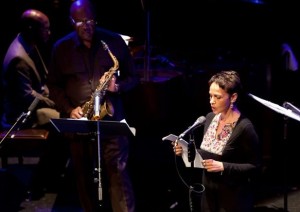Alexandra Petrova: “Russia, My Blind Mother.”
by Rita Malikonyte Mockus / October 31, 2011 / 2 Comments
The poet talks to us about Russia, St. Petersburg, Italy, literature, and the out-of-body experience of good translation
Alexandra Petrova is an award-winning Russian poet and fiction writer who resides in Rome. She is the author of three collections of poetry, Point of Detachment (1994), Residence Permit (2000), and Just the Trees (2008). Her poems have appeared in several Russian magazines as well as in Literary Revue, Modern Poetry in Translation, Drunken Boat, and Guernica among others. Alexandra has also written a libretto for a philosophical operetta “Dolly’s Shepherds.” She is currently writing her first novel at the University of Iowa with the International Writing Program.
Petrova was one of the readers at City of Asylum’s 2011 Jazz/Poetry Concert; she was interviewed by Rita Mockus at the New Hazlett Theatre on the day of her debut reading in Pittsburgh. In this interview Petrova talks about St. Petersburg’s international characteristics, Russia’s problems with forgotten history, and the out-of-body experience of good translation.
Let’s talk about your journey as a creative writer. You were born in Russia, later you shortly lived in Estonia and Israel, and now you live in Italy. Does immigration have an effect on your poetry?
I have lived abroad half of my life, but I still write in Russian. Just this year I began writing in Italian; I wrote several short stories, just for fun, but I have noticed that another personality came out of my writing in a foreign language. I’m very different when I write in Italian and it’s interesting for me to discover how much the language we use can affect our personality and our writing style.
Some people believe that my life and my experiences abroad have changed my poetry, but in my opinion, it hasn’t changed that much. I was born and, for many years, I lived in St. Petersburg, an international city which provided a chance for me to live abroad while I was still in Russia.
For me St. Petersburg—which, by the way, is not a Russian name—was the center of the world, inhabited by various cultures living together in symbiosis. For example, strolling down the streets of St. Petersburg I would see an Armenian church, and soon after, a Catholic church, followed by a Lutheran church.
I also lived very close to the Hermitage museum so I would frequently go there after school to explore Italian art or Dutch still life. .For a child growing in St Peterburg it was inevitable and completely natural not to feel much difference between Russian and Italian pronunciation of such names as, for example, Rinaldi, Brenna or Rastrelli.
To answer your question, I started writing poetry before I left Russia, but now, living outside of it, I feel that I have a better grasp of why my native country is the way it is. Perhaps distance is helping me…
In your poem “My Place,” the last line reads, “My nesting place / Italy / my resting place.” Can you comment on that?
When I came to Rome, I visited the historic Cimitero acattolico, a famous non-Catholic cemetery where a lot of English writers, including Keats and Percy Shelley were buried along with several important 17th and 18th century Russians. In its literal sense it is a very romantic place. The phrase “my resting place” is also a playful allusion to this cemetery. I love including a secret or even a childish drawing in my poems. In this particular poem I use antique Slavic words that in Russian have the same root, meaning ‘place.’ I am also interested in occasionally employing words like, for example, kladbishia that has a dual meaning of cemetery and cache.
When you metaphorically write, “Russia, my blind mother, / I, your coachman, am freezing inside of you,” what are you actually saying?
The word I use here for ‘mother’ is mamasha. I guess there is no word in English that would accurately describe what I intend to convey by this Russian word. Mamasha means a very cold, unloving woman or mother. Even though I am Russian and love my country, I still think that Russia is blind and, in some ways, cold and terrible.
It seems to me that Russia holds no memory of herself. She is blind because she can’t see how her own history shapes her people. Every new period wipes off everything preceding it. Beginning with Peter the Great, the Tsar who drastically changed Russia’s old culture and killed many people, every new reformation or revolution in Russia makes the memory of the former era sound either criminal or completely right. Nothing in between seems to exist. For example, now some people are nostalgic even of Stalin’s Soviet times. Why? Because they don’t remember how things truly were during those times. This blind mentality is very sad.
“It seems to me that Russia holds no memory of herself. She is blind because she can’t see how her own history shapes her people.”
Is there a difference between poetry and political statement?
Political or not, good poetry is always contemporary. One doesn’t have to write about, say, how terrible Vladamir Putin is. One can write about the ageless topic of trees and still use a current cultural or political point of view. Poetry doesn’t have to be political, but I think that good poetry is never pure demagogy.
Do you accept translation or do you think that it can never adequately represent a poetic text?
Generally, I don’t believe in translation. The Italians have a saying: Traduttore e` traditore (a translator is a traitor), but it’s not always true. Sometimes translation improves the original—in my case, I hope not.
However, I also work as a translator. I have just finished translating a rather difficult text (Patrizia Cavalli’s Patria) and I guess Italians, like us Russians, think about their country all the time. In translation, literary works always look different. When you translate, you have to try to discover the spirit of the poem—which is written in a language that is foreign to you—and completely immerse yourself in it. It’s like you’re entering the writer’s mind and body. If that happens, then the translation is successful.
Is freedom of creative expression still repressed in Russia? Are there limitations on what can be published in Russia?
Nowadays you can write about anything you want in Russia. You can also find a publisher for your work. Ironically, that doesn’t change anything. Well, of course, if you are a journalist and write about dangerous topics such as Chechnya or corruption, then it’s a different story. However, nobody pays any attention to what is happening in novels or poems. Creative writing no longer has the power to change anything in society or politics. It had that power before—people were even afraid of its allegorical and symbolic meaning—but not anymore. It’s very depressing. I don’t know how things will be in the future. Even though I don’t live there at the present moment, I write in Russian, so it still concerns me.
Your writing has moved from poetry to philosophical play (operetta), and now you are writing your first novel. What prompts you to try different genres? How are they different from each other?
When I was writing my operetta I noticed that I was able to engage with the absurd world in a more effective way than in my poetry or prose. Prose is different from poetry because it has a much slower pace. In poetry you can do away with all the ‘unnecessary’ words. In prose you can’t completely avoid description. You have to write about a lot of mundane details and sometimes use boring words and sentences.
Does your writing—poetry, prose, or drama—in any way address issues of contemporary feminism?
I am a natural feminist, so I don’t think it’s one of my obsessions. I was born in a family of women who had university degrees. My great grandmother went to college, and so did my grandmother, and later my mother. Our house was predominately female, we didn’t have to deal with male characters and constantly fight for our rights. I understand that there are women for whom this subject is of cardinal significance, but feminism is not one of my topics.
You have started your international writing program in Iowa. What effect do you hope the Iowa experience will have on your poetry?
I don’t know, maybe I will write something about the squirrels—use them as a metaphor for something. By the way, there is an abundance of them in Iowa. Otherwise, I don’t know; we will see. Perhaps later I will be able to say more about my experience there.
Read a selection of Alexandra Petrova’s poetry from Iowa’s International Writers Program.








2 Comments on "Alexandra Petrova: “Russia, My Blind Mother.”"
Trackbacks for this post